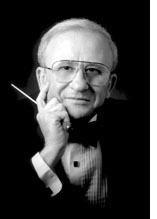|
By David Amos
 SAN DIEGO—As we all know, the arts are not exact sciences. They provoke emotions, and are more likely to be called subjective than objective. This opens the door for lavish praise which may be misplaced, undue criticism, which may make the source sound knowledgeable, or can be plainly a gross stretch of the facts. SAN DIEGO—As we all know, the arts are not exact sciences. They provoke emotions, and are more likely to be called subjective than objective. This opens the door for lavish praise which may be misplaced, undue criticism, which may make the source sound knowledgeable, or can be plainly a gross stretch of the facts.
I first thought of this article as it relates to music, but the more I worked on it, I saw that it could apply to so many other aspects of everyday life. We are bombarded by words that are so overused in both frequency and degree, that they have lost practically all their impact.
Take, for example, the word genius. This description should be reserved for Newton, Galileo, Einstein, Mozart, and very few others. But in today’s world, everyone with above average intelligence or achievements is quickly labeled a genius! A football strategist, a successful financier, a publicity innovator, a political peacemaker; they may all be successful overachievers, but hardly geniuses.
Other overused words which make me skeptical as to their credibility include maven, guru, expert, world-class, specialist, master, professional, masterpiece, icon, professional grade, rising star, super, ultimate, definitive, child prodigy, sensational, and many other all of us are guilty of using carelessly at one time or another. My two latest favorite words to avoid are amazing and awesome. We get carried away by our emotions, and with good intentions, overstate the value of the subject at hand.
Since when is a custodian be called a sanitation engineer? Maybe after an intensive seminar of “Custodial Services and the Environment, the Challenge of the 21st Century”.
I am both amused and appalled at the radio commercial for home financing, where the pedestrian sounding announcer (probably someone who works for the sponsor) suggests that “this is the biggest no-brainer in the history of mankind." At least he made me laugh. Once.
Should all major composers in history, whose names we easily recognize and whose music we enjoy be called masters? Possibly, but let’s be careful here, for one person’s master is another’s “insignificant other."
Some time ago, I wrote an article praising the virtues of Mozart, who is universally recognized as one of the greatest minds in history. I even invited a guest column by Arnold Rosner, a composer whose views of Mozart are quite different than that of most of us. He is quoted as saying that”Mozart
Go to the top of right column
|
|
may not be the worst composer who ever lived, but he is certainly the most overrated." But, nevertheless, whether we adore Mozart, like, or dislike his music, it is an irrefutable fact that his legendary gifts and abilities in music composition and performance qualify him to be called a genius.
This manipulation of language to gain other peoples’ sympathy, enthusiasm, or money, as the case may be, is more often than not, a ploy to commercially promote a work, a service, a product, an artist, or an ensemble of any kind to be seen as better than they may really be. This has happened throughout history in all walks of life. These superlatives are legitimate some of the time, but are used so frequently that it is difficult to separate the wheat from the chaff.
Which brings me to one of my favorite musical peeves, the instant standing ovation for music that ends loud and/or fast. San Diego music audiences seem to be especially smitten by this affliction. Yes, standing ovations are a legitimate way to show strong approval for the music we just heard, but at least I try to be more discriminating and selective. We should reserve our ovations only for the very best, and these do not come to us too frequently. And here is where we have to learn the often subtle differences between the very good and the really great.
I have attended theatre performances at San Diego’s Old Globe for decades, and after watching dozens and dozens of plays, I recall some truly outstanding ones. But I can hardly remember audiences jumping to their feet at many of these. Could it be that theatre drama audiences are more knowledgeable and sophisticated than symphony, chamber music or opera audiences? Possibly. But as much as we mock and dismiss obvious charlatanism from certain performers and promoters, we should be cautious at our own inflated or pretentious falsities, even when uttered or demonstrated with good intentions.
In music, good stage presence and showmanship are often mistaken for a great performance. And the reverse may apply also. The secret is to simply listen and learn as much as possible to what you are about to hear. Serious music transcends the “music for entertainment” syndrome, but it also provides us far deeper and enduring satisfaction.
The best balance for my modest diatribe is for musical audiences to be better informed, to be more seasoned listeners, to attend more concerts of every kind, and to be a bit more cautious when over-praising or over-criticizing a particular artist, ensemble, composer, or a musical work. Also, be careful of what you hear others say and write. History has proven time and time again the errors of our ways.
|
|

